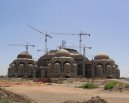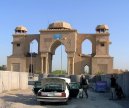| Introduction - Iraq: |
| Location - Iraq: |
| People - Iraq: |
| Government - Iraq: |
| Economy - Iraq: |
Economy overview | Iraqs economy is dominated by the oil sector, which has traditionally provided about 95% of foreign exchange earnings. Iraqs seizure of Kuwait in August 1990, subsequent international economic sanctions, and damage from military action by an international coalition beginning in January 1991 drastically reduced economic activity. Although government policies supporting large military and internal security forces and allocating resources to key supporters of the regime hurt the economy, implementation of the UNs oil-for-food program, which began in December 1996, helped improve conditions for the average Iraqi citizen. Iraq was allowed to export limited amounts of oil in exchange for food, medicine, and some infrastructure spare parts. In December 1999, the UN Security Council authorized Iraq to export under the program as much oil as required to meet humanitarian needs. The military victory of the US-led coalition in March-April 2003 resulted in the shutdown of much of the central economic administrative structure. Although a comparatively small amount of capital plant was damaged during the hostilities, looting, insurgent attacks, and sabotage have undermined efforts to rebuild the economy. Attacks on key economic facilities - especially oil pipelines and infrastructure - have prevented Iraq from reaching projected export volumes, but total government revenues have been higher than anticipated due to high oil prices. Despite political uncertainty, Iraq is making some progress in building the institutions needed to implement economic policy and has negotiated a debt reduction agreement with the Paris Club and a Standby Arrangement with the IMF. An International Compact with Iraq is being established to integrate Iraq into the regional and global economy, while recognizing the need to resolve destabilizing security and political conflicts. Additionally, the Iraqi government is seeking to pass laws to strengthen the economy; this legislation includes a hydrocarbon law to encourage contracting with foreign investors and a revenue sharing law to equitably divide oil revenues within the nation. Controlling inflation, reducing corruption, and implementing structural reforms such as bank restructuring and developing the private sector, will be key to Iraqs economic prospects. |
|
Gdp purchasing power parity | $87.9 billion (2006 est.) |
|
Gdp official exchange rate | $40.66 billion (2006 est.) |
|
Gdp real growth rate | 2.4% (2006 est.) |
|
Gdp per capita ppp | $2,900 (2006 est.) |
|
Gdp composition by sector | agriculture: 7.3%
industry: 66.6%
services: 26.1% (2004 est.) |
|
Labor force | 7.4 million (2004 est.) |
|
Labor force by occupation | agriculture: NA%
industry: NA%
services: NA% |
|
Unemployment rate | 25% to 30% (2005 est.) |
|
Population below poverty line | NA% |
|
Household income or consumption by percentage share | lowest 10%: NA%
highest 10%: NA% |
|
Inflation rate consumer prices | 64.8% (2006 est.) |
|
Budget | revenues: $33.4 billion
expenditures: $41 billion (2006 est.) |
|
Agriculture products | wheat, barley, rice, vegetables, dates, cotton; cattle, sheep, poultry |
|
Industries | petroleum, chemicals, textiles, leather, construction materials, food processing, fertilizer, metal fabrication/processing |
|
Industrial production growth rate | NA% |
|
Electricity production | 34.6 billion kWh (2006) |
|
Electricity consumption | 33.3 billion kWh (2005) |
|
Electricity exports | 0 kWh (2005) |
|
Electricity imports | 2.02 billion kWh (2005) |
|
Oil production | 2.13 million bbl/day; note - prewar production in 2002 was 2.2 million bbl/day (2006 est.) |
|
Oil consumption | 377,000 bbl/day (2006 est.) |
|
Oil exports | 1.5 million bbl/day (2006 est.) |
|
Oil imports | 98,330 bbl/day (2004) |
|
Oil proved reserves | 112.5 billion bbl (2006 est.) |
|
Natural gas production | 1.75 billion cu m (2006 est.) |
|
Natural gas consumption | 1.75 billion cu m (2006 est.) |
|
Natural gas exports | 0 cu m (2006 est.) |
|
Natural gas imports | 0 cu m (2006 est.) |
|
Natural gas proved reserves | 3.115 trillion cu m (1 January 2005 est.) |
|
Current account balance | $8.134 billion (2006 est.) |
|
Exports | $32.19 billion f.o.b. (2006 est.) |
|
Exports commodities | crude oil 84%, crude materials excluding fuels 8%, food and live animals 5% |
|
Exports partners | US 46.6%, Italy 10.7%, Canada 6.2%, Spain 6.1% (2006) |
|
Imports | $20.76 billion f.o.b. (2006 est.) |
|
Imports commodities | food, medicine, manufactures |
|
Imports partners | Syria 26.9%, Turkey 20.6%, US 12%, Jordan 7.3% (2006) |
|
Reserves of foreign exchange and gold | $15.65 billion (2006 est.) |
|
Debt external | $81.48 billion (2006 est.) |
|
Economic aid recipient | $13.5 billion pledged in foreign aid for 2004-07 from outside of the US, over $33 billion pledged total (2004) |
|
Currency code | New Iraqi dinar (NID) as of 22 January 2004 |
|
Exchange rates | New Iraqi dinars per US dollar - 1,466 (2006), 1,475 (2005), 1,890 (second half, 2003), 0.3109 (2001) |
|
| Communications - Iraq: |
| Transportation - Iraq: |
| Military - Iraq: |
This page was last updated on 16 September, 2007



